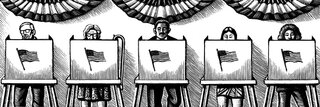
Risks Ahead in SCOTUS 'Independent State Legislature Theory' Case
Dangers remain as the justices explore a different path for deciding Moore v. Harper.
The Supreme Court’s December 7 oral argument in Moore v. Harper offered some encouraging signs the justices won’t give their full-throated endorsement to the so-called “independent state legislature theory.” That would represent a significant victory for democracy given the theory’s election-detonating consequences — but we’re not clear of Moore’s dangers just yet.
The justices used the argument to explore ways the Court could grant itself new power to review state court rulings. Depending on how the Court defines this power, Moore could transform the relationship between state and federal courts in election cases, posing a whole new set of risks.
The North Carolina legislators who brought the lawsuit asked the justices to restore their extreme gerrymander of their state’s congressional map by adopting the independent state legislature theory, which argues that the U.S. Constitution gives state legislatures near-absolute power to regulate federal elections. Reassuringly, each of the three justices whose votes might decide the case —John Roberts, Brett Kavanaugh, and Amy Coney Barrett — expressed healthy skepticism of the theory during argument. Of course, arguments aren’t predictive of ultimate results, but the justices’ questions warrant cautious optimism that the theory is too extreme even for this Court’s radically conservative supermajority.
That said, these same justices and others showed interest in a different path to resolve the case. That path would reject the idea at the theory’s core: that state legislatures aren’t checked by state constitutions or state governmental entities like courts when making the rules for federal elections. Instead, the notion the justices were exploring would give the Supreme Court the power to overturn state court rulings that it deems to be lawless. The justices and lawyers on the case seemed to have different views of the kinds of rulings that would qualify, and a substantial portion of the oral argument focused on the conditions that would trigger the Court’s review.
The lawyers representing the voters and nonprofits challenging the gerrymandered maps emphasized that this power must be extremely limited. Crucially, they stressed, the Supreme Court must not be able to overturn a state court’s ruling just because it disagrees with it. Instead, the Court must craft a rule that gives a “sky-high” level of deference to state courts, permitting the justices to intervene only in the very rare circumstance that a state court has truly gone off the rails.
If the Court crafts such a deferential standard, clearly explains its limited availability, and faithfully applies it here and in future cases, then Moore’s impact could be modest. Indeed, it would replicate the narrow conditions under which federal courts can already review state court interpretations of state law in legal disputes that implicate federal rights, such as cases where the state government has tried to seize private property.
There is a risk, however, that the Court could adopt a less deferential standard that empowers it to second-guess any state court decisions that it wished had been decided differently. Some justices, for example, voiced concerns during argument about courts “acting as legislatures” — an objection that sounds uncomfortably close to the conservative legal movement’s regular refrain that judges they disagree with are not judging but “legislating from the bench.”
A low barrier to Supreme Court review — or even just an unclear one — would be potentially as disruptive as a ruling embracing the independent state legislature theory. It would allow the justices to pick and choose which state court election law rulings are acceptable and which are not on a case-by-case, state-by-state, election-by-election, and issue-by-issue basis. Effectively, the Court would be positioning itself to reshape the electoral systems of each state as it pleases.
This second-guessing is exactly what the Conference of Chief Justices — a bipartisan group of current and former chief justices from the 50 states, the District of Columbia, and U.S. territories — warned about in their “friend-of-the-court” brief in Moore. A decision along these lines would create new uncertainty in elections by undermining the finality of state court rulings. That could make administering elections — where the certainty of rules is very important — even harder. And it would give the Roberts Court, which has gutted the Voting Rights Act and roadblocked efforts to stop partisan gerrymandering, even more leeway to continue to undermine voting rights.
We’ll find out where the Court lands before the end of this term in late June. But it’s crucial that if the Court goes down the path it discussed at argument, it opts for a resolution that will defer to state courts in all but the most extreme circumstances — and make that extremely clear to future litigants. Anything less risks replicating many of the same problems that the independent state legislature theory poses and that the Court should strive hard to avoid.
Ethan Herenstein is counsel with the Democracy Program’s Voting Rights and Elections team.
Thomas Wolf is a deputy director in the Brennan Center’s Democracy Program.
Suggested Citation: Ethan Herenstein & Thomas Wolf, Risks Ahead in SCOTUS ‘Independent State Legislature Theory’ Case, Sᴛᴀᴛᴇ Cᴏᴜʀᴛ Rᴇᴘᴏʀᴛ (Jan. 19, 2023), https://statecourtreport.org/our-work/analysis-opinion/risks-ahead-scotus-independent-state-legislature-theory-case.



Related Commentary
How Courts Oversee Ballot Initiatives
State courts — and to some degree federal courts — play a significant role in every stage of the direct democracy process.
Florida High Court to Hear Arguments in Politicized “Voter Fraud” Case
The case challenges Gov. Ron DeSantis’s prosecutions of people with felony convictions who thought they were eligible to vote.
State Court Oral Arguments to Watch for in February
Issues on the dockets include affirmative action, partisan gerrymandering, unaffordable bail, and juryless agency trials.
Voting Rights and Democracy in State Courts
Transcript of panel from Symposium: The Power of State Constitutional Rights